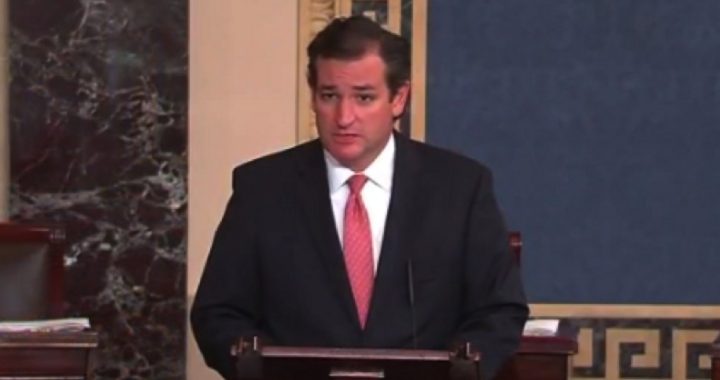
Freshman U.S. Senator Ted Cruz (R-Texas), shown, began a marathon speech against funding President Obama’s landmark legislation on healthcare at 2:41 p.m. September 24, as the U.S. Senate moves toward a vote later this week on a “continuing resolution” to keep the federal government funded through December 15. “I rise today in opposition to ObamaCare,” Cruz began his speech, which exceeded Rand Paul’s 13-hour long filibuster earlier this year. “I intend to speak in support of defunding ObamaCare until I am no longer able to stand.”
The focus of Cruz’s all-night speech was how many employers are refusing to hire new employees, or more often, employing only part-time workers. Since Obama signed the Patient Protection and Affordable Care Act (PPACA) in March 2010 near the depths of the “great recession,” the number of persons working part-time has remained steady, according to the U.S. Bureau of Labor Statistics, as has the nation’s record-low labor force participation rates. The labor force participation rate has been stuck in the 58-percent range since 2009, making this the weakest recovery in American history. Cruz stressed that many companies have either trimmed hours of full-time employees, or delayed hiring over the 50-person requirement that triggers the employer mandate under ObamaCare.
But ObamaCare has created some new jobs for people to help guide citizens through the vast new bureaucracy, according to the Washington Post, such as the 7,000-9,000 additional “raft of new jobs in call centers, IT companies and community organizations designed to help Americans understand the complex health law and navigate the new insurance marketplaces.”
Cruz also noted that even government unions have sought exemptions from the provisions of the law, and that some premiums have already increased by huge margins, such as with one Louisville, Kentucky, family who saw their premiums triple this year as a result of ObamaCare.
Cruz’s marathon speech was technically not a filibuster, because the Senate already has it on its schedule to vote Wednesday afternoon on procedural matters related to the continuing resolution, H.J. Res. 59, a bill that would fund most operations of the federal government until late in the fall. Cruz will have to yield the floor of the Senate at about 1 p.m. Wednesday, September 25 for several scheduled procedural votes on the “continuing resolution,” regardless of whether he is done talking at that point.
The House-passed version of the continuing resolution would fund most federal agencies through December 15 and cut funding for implementation of the Patient Protection and Affordable Care Act (PPACA), i.e., ObamaCare. Senate Majority Leader Harry Reid’s version of the bill is expected to shorten the term of the continuing resolution to November 15 but to restore funding for the PPACA. Congress must pass a funding bill by the end of the month or face a partial government shutdown.
The fact that Cruz’s marathon speech is technically not a filibuster was a point Senate Democrats have stressed. “I want to make sure everyone understands: There is no filibuster today,” Harry Reid (D-Nev.) said before handing the Senate floor over to Cruz. “We are going to vote tomorrow. Under the rules no one can stop that.”
Reid also used that occasion to criticize tactics by unnamed newer Tea Party-aligned senators, such as Cruz, whom he characterized as “tea party anarchists” and “fanatics” with the goal of “taking the federal government and our economy hostage to their demands.” But thoughtful observers must ask: Who’s really threatening to bring the government shutdown? Which side is really using the congressional appropriations process as an extortion tactic? President Obama has threatened to veto Republican-passed spending bills, such as the continuing resolution, in which he does not disagree with one penny of spending. What Obama and the Senate Democrats object to is spending that’s not in the bills, and on that basis they threaten to veto the House-passed legislation (which would keep the federal government business functioning normally) and create a partial government shutdown. In essence, the Republicans have passed all the spending to which they can agree, and the White House and congressional Democrats threaten that unless they get all the spending they’ve demanded, the federal government will not spend any more money at all.
Cruz was helped in his virtual filibuster by several Republican colleagues, including Rand Paul of Kentucky, Mike Lee of Utah, Jeff Sessions of Alabama, Marco Rubio of Florida, and Pat Roberts of Kansas. Cruz’s frequent invocation to “make D.C. Listen” blew up the Twitter-verse with the hashtag #MakeDCListen.



